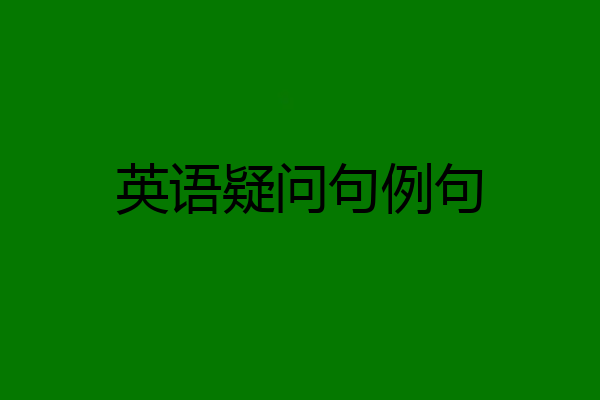
长虫虫的橘子
一、什么是一般疑问句疑问句总共分为4种类型,一般疑问句就是其中之一。在通常情况下,一般疑问句只能用yes或no来回答。一般疑问句也是初中英语教材中核心的语法知识点。二、一般疑问句的结构1、一般疑问句通常以be动词、助动词或情态动词为首,后跟主语,再接句子的相关成分,例:Are you from Beijing?你是来自北京的吗?(are为be动词,you为主语)Do you work in a bank?你在一家银行工作吗?(do为助动词,you为主语)May I borrow your book?我能借你的书用一下吗?(may为情态动词,I为主语)2、一般疑问句的回答,通常为以下结构:肯定:Yes,主语+提问的be/助动词/情态动词.否定:No,主语+提问的be/助动词/情态动词的否定形式.例句:Are you from Japan﹖Yes, I am. / No, I'm not.Do you work in a bank?Yes, I do. / No, I don't.May I borrow your book?Yes, you may. / No, you mustn't.三、肯定句改一般疑问句的规则1. 肯定句中有some,就把some变成any。例句:There are some apples on the table.Are there any apples on the table?2.肯定句中有be动词(are/is)就把be动词提到句首。例句:You are a teacher.Are you a teacher?3.肯定句中有be动词的过去式(was/were),将其提到句首。例句:You were a doctor.Were you a doctor?4. 肯定句中有情态动词(can/could/will/would/shall/may/must),将其提到句首。例句:I may go home now.May I go home now?5. 肯定句中有had better,就把Had提到句首。例句:I'd better go now.Had I better go now?6. 肯定句中有肯定句中有实义动词原型,就在句首加Do。例句:I work in a bank.Do you work in a bank?7. 肯定句中有实义动词三单现,就在句首加Does, 实义动词三单现变回实义动词原型。例句:He works in a bankDoes he works in a bank.8. 肯定句中有实义动词过去式,就在句首加Did, 实义动词过去式变回实义动词原型。例句:He told you.Did he tell you?9. 肯定句是I am… ,就把I am…变成Are you….。例句:I am a Chinese.Are you a Chinese.10. 变一般疑问句时,肯定句I was… ,就把I was…变成Were you…。例句:I was a teacher.Were you a teacher.


嘻哈精神9999
1、一般现在时: 一般疑问句:Do you watch TV at home? 肯定句:You watch TV at home. 否定句:You don't watch TV at home.特殊疑问:What do you do at home? 2、一般过去时: 一般疑问句:Did he break the window yesterday? 肯定句:He broke the window yesteray. 否定句:He did not break the window yesterday.特殊疑问句:When did he break the window yesterday? 3、一般将来时: 一般疑问句:Will/Are you going to play football tomorrow? 肯定句:I will/am going to play football tomorrow. 否定句:I won't/am not going to play football tomorrow. 特殊疑问句:What are you going to do tomorrow? 4、现在进行时: 一般疑问句:Is she playing badminton now? 肯定句:She is playing badminton. 否定句:She isn't playing badminton now.特殊疑问句:What is she doing now?5、现在完成时: 一般疑问句:Has he finished his homework? 肯定句:He has already finished his homework. 否定句:He hasn't finished his homework yet. 特殊疑问句:What has he done? 6、过去进行时: 一般疑问句:Was he playing basketball at 7p.m.yesterday? 肯定句:He was playing basketball at 7p.m.yesterday. 否定句:He wasn't playing basketball at 7p.m.yesterday.特殊疑问句:What was he doing at 7:00 p.m.yesterday? 7、过去完成时: 一般疑问句:Had the train gone when you arrived? 肯定句:The train had gone when I arrived. 否定句:The train hadn't gone when I arrived.一般疑问句:What happened when you arrived? 8、过去将来时: 一般疑问句:I didn't know if he would come. 肯定句:He said he would help me. 否定句:He wouldn't come.特殊疑问句:What did he say?不是很了解你要哪些句子啊.

catebutslim
一般疑问句10个例句:
1、I’m thirteen years old.
Are you thirteen years old?
2、He likes his family members.
Does he like his family members?
3、We are singing and dancing.
Are you singing and dancing?
4、Mary can ride a bike.
Can Mary ride a bike?
5、John is a tall and kind person.
Is John a tall and kind person?
6、There is some broccoli in the bowl.
Is there any broccoli in the bowl?
7、I will take it.
Will you take it?
8、Her sister-in-law is a teacher.
Is her sister-in-law a teacher?
9、My father cooks well.
Does your father cook well?
10、Our little brother draws a nice picture.
Does your little brother draw a nice picture?
一般疑问句采用简短回答
即答语分为三部分:
1、不是yes就是no。
2、问谁答谁,即答语中的主语与问句中的主语保持一致,如果主语是this\that,答语用it代替,如果主语是these、those,答语用Thay are代替。
3、用什么问用什么答,即沿用问句中的引导词。注意:由may引导的问句,肯定回答用may,否定回答用can’t或mustn’t;用must引导的问句,肯定回答用must,否定回答用needn’t。

苏州齐惠壮士
选择疑问句(alternative questions)一般提出两种或两种以上的可能,问对方选择哪一种.其结构可用一般疑问句,也可用特殊疑问句,供选择的两部分由or连接,前者用升调,后者用降调,如:1.Would you like coffee or milk?Either is ok.2.—Would you like coffee or tea?—Tea,3.—Shall we watch TV or go to the concert?—I’d prefer to go to the concert.4.—Shall I come to pick you up or shall we meet at the airport?—As you please.5.Will you go there by bus or by train?你准备乘汽车,还是乘火车去那儿?6.How many pens do you have ,one or two?你有几枝钢笔,一枝还是两枝?7.s it right or wrong?是对还是错?8.Were you or he there?是你还是他在那儿?9.Are they reading,chatting or watching television?他们是在看书、聊天,还是在看电视?10.Do you want to go there by land or by air?你将乘车还是乘飞机去那儿?11.Which do you like better,coffee or milk?你更喜欢喝什么,咖啡还是牛奶?12.What colour is it,red,blue or yellow?它是什么颜色,红的,蓝的,还是黄的?13.Where are you going,to the classroom or to the library?你要去哪儿,教室还是图书馆?14.How shall we go,by sea or by land?我们怎么去,走水路还是陆路?15.Do you want to buy it or not?你是想买它还是不想买?16.Are you ready or not?你准备好了还是没有准备好?17.—Do you go to work by
优质英语培训问答知识库